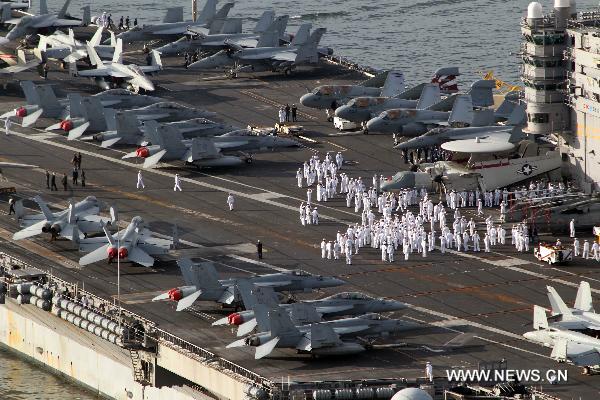ROK, U.S. begin joint navy drills
The United States and South Korea launched their large-scale military drills in the Sea of Japan on Sunday, a move that is feared may further complicate security situation in the region.
Many analysts expressed the concern that the war games, which involve the Nimitz-class aircraft carrier USS George Washington, 20 ships and submarines and 200 aircraft, with about 8,000 troops on board, could highten tension on the Korean Peninsula, thus making dialogues more difficult in the near future.
In the wake of the sinking in March of a South Korean warship, the United States and South Korea announced new sanctions against Pyongyang and a series of joint military exercises in the waters off the coast of the Korean Peninsula.
The hardline stance incurred fierce response from the Democratic People's Republic of Korea (DPRK) in the north, which was blamed for the incident by Washington and Seoul.
The DPRK's National Defense Commission threatened on Saturday to mount a nuclear deterrence to counter the muscle flexing of the United States and South Korea.
Labeling the maneuvers as "nothing but outright provocations aimed to stifle the DPRK by force," a spokesman of the defense commission said it is a natural option of the army and people of the DPRK to take corresponding all-out retaliatory measures.
At a Southeast Asian security forum concluded Friday in Hanoi and attended by U.S. Secretary of State Hillary Rodham Clinton, a DPRK spokesman warned a "physical response" to the U.S.-South Korean drills.
"There will be a physical response against the steps imposed by the United States, militarily," DPRK delegation spokesman Ri Tong Il told reporters.
He noted that it is no longer the 19th century when Western powers maintained gunboat diplomacy in the region.
The military maneuvers posed a "grave threat to the Korean Peninsula, and also the region of Asia as a whole," he said.
Pyongyang has considered the war games as "an unpardonable second military provocation to the DPRK" after Seoul's publication of investigation results of the sinking of "Cheonan" warship, which killed 46 sailors.
A team of multinational investigators led by South Korea concluded late May that the warship was sunken by a torpedo attack of the DPRK, a claim Pyongyang fiercely rejected. Pyongyang offered to send its own investigators to verify the results. But South Korea turned down the offer.
 0
0 







